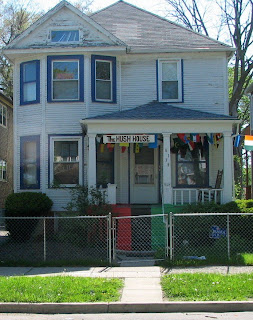
Certain communities, both racial and class specific, are represented in much higher than average conviction rates. The common response to this is to increase punishment for these offenses. This repeated, frenzied approach at forced economic and social assimilation of certain populations has resulted in increased incarceration rates, all the while the ages of the convicted are decreasing. Recidivism is common and nationally, crime has not been greatly stymied by threat of fines, imprisonment and even death. Correctional facilities can hardly be said to correct the actions of the incarcerated; only through the use of fear of re-imprisonment can they reach any form of ‘success’.
Ironically, one of the connecting threads that link rustbelt cities is that their economic success has somewhat mirrored our country’s involvement in conflict: from producing cannons for the Civil War all the way to producing jeeps in Vietnam. A system of global reactionism abroad is merely a representation of the system of punishment and reactionism at home. It is also in these cities that some of our country’s most drastic social, economic and environmental issues have bubbled up to the surface of our national consciousness. Our cities’ hearts of industry are also our hearts of American values and idealism: a high quality of life, happiness, and the betterment for future generations.
Unfortunately, brash, omnipotent and broad generalizations are adjectives of our modern system of reaction to undesirable or threatening behavior. The repeated failure of this methodology over generations is evident in the communities around us. From something as seemingly benign as outdated zoning to dangerous zero-tolerance laws, this overzealous approach at punishment and control has been a failure. Instead, an understanding of an individual’s conflict with institutionalized inequity should be evaluated – and only this understanding and eventual change will result in effective, sustainable and adaptable equity.
After visiting with Sandra and Charles from Detroit’s Hush House, I understand that the underlying theme of their work is love. This love is their counterbalance to the aggressive reactionsim that surrounds us in our daily lives: the carrot versus stick. By putting blame and finger-pointing aside, love can be a tool to highlight the web of interrelationships that we experience. We all have our differences; from tastes in food, to political persuasions, to the shade of our skin. Love does not look for a melting pot, assimilation or diversity. What love looks for is where we agree and connect as human beings; the places where personal nodes of interrelationships connect. Community is love, not punishment, retribution or reactionism. How can we as humans build a community if we use a system of fear and control ? Love is passion, sacrifice and service, and our communities need its residents to be strong and willing participants.
“Approach a person with a popsicle”
-Mamma Sandra, Hush House
"Let me say, with the risk of appearing ridiculous, that the true revolutionary is guided by strong feelings of love." -Ernesto Che Guevara
ReplyDelete